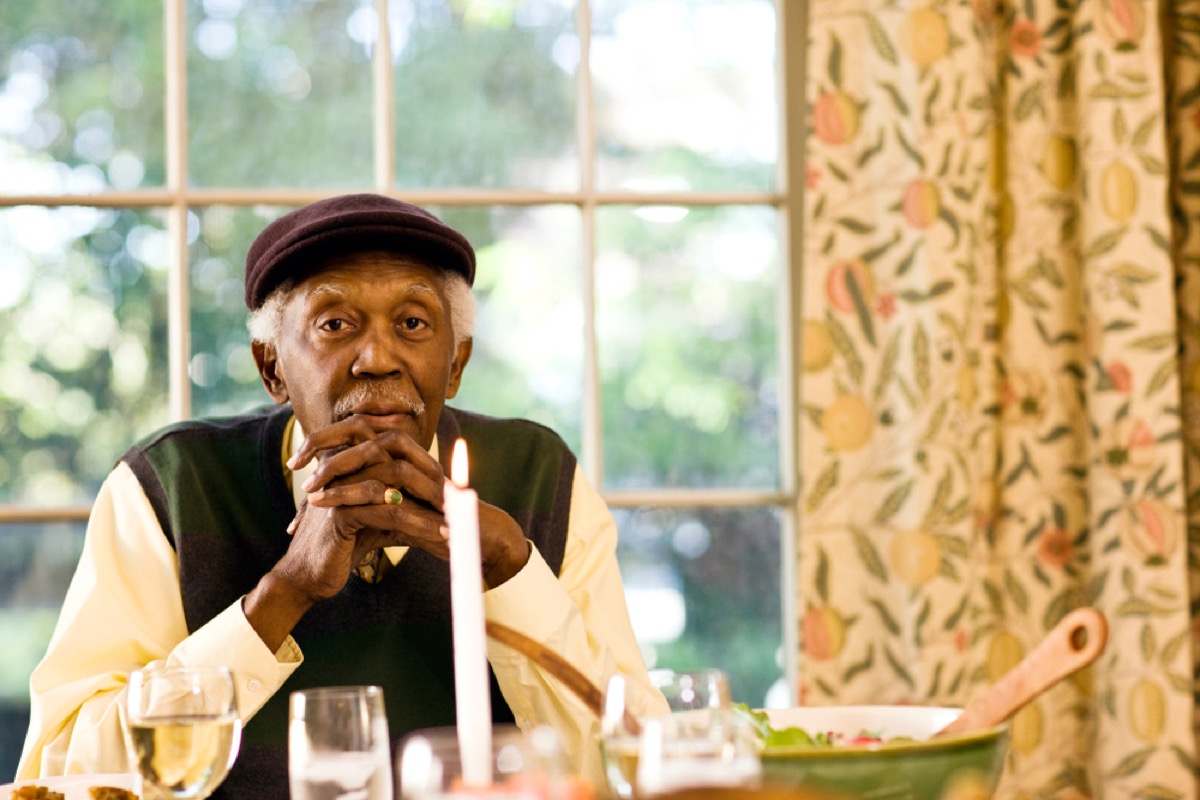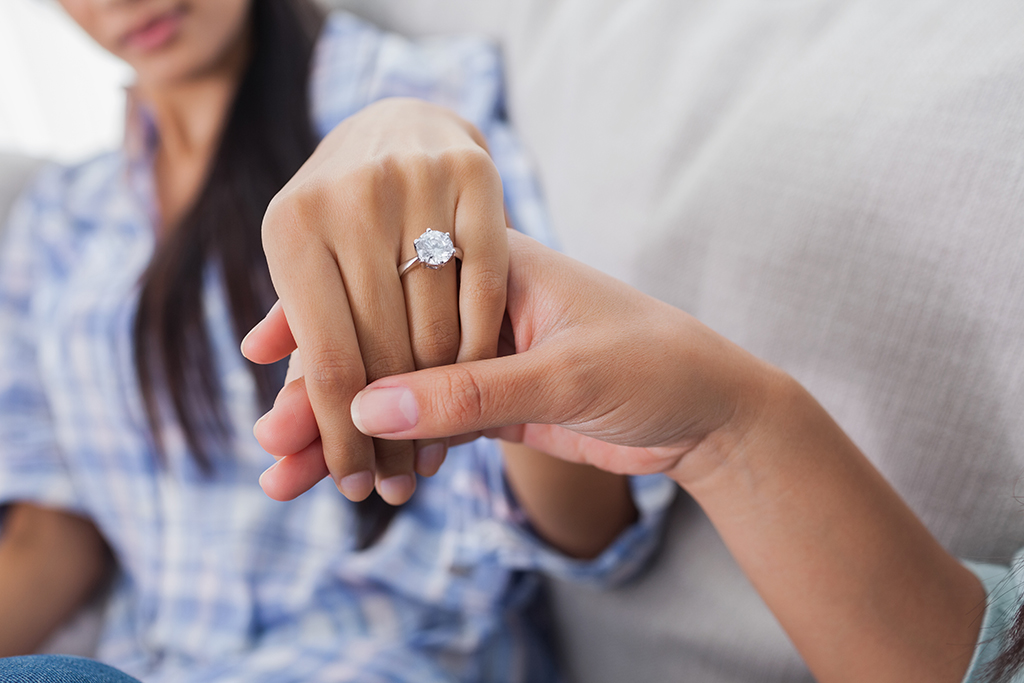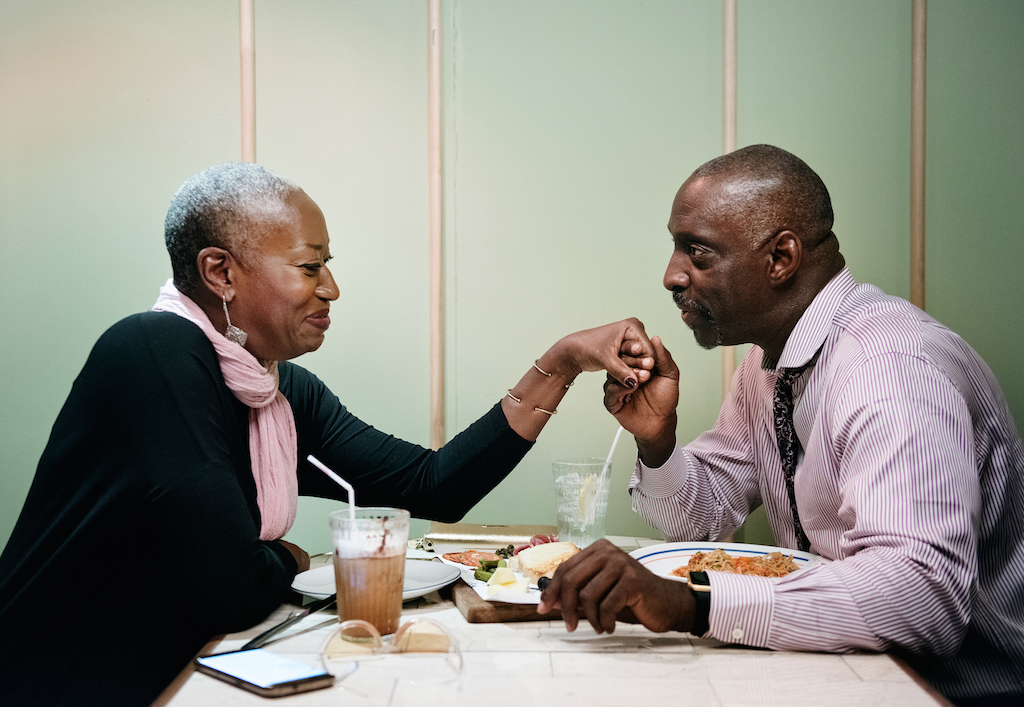33 Forgotten Etiquette Rules to Practice for Impeccable Manners
People were far more polite back in the day.

Etiquette rules don't always age well. In fact, some from centuries ago seem downright ridiculous today. For example, in the 1883 manners manual American Etiquette and Rules of Politeness, Professor Walter R. Houghton and his colleagues explain that when a man is introduced to a woman, "both should bow slightly, and it is the duty of the gentleman to start a conversation." A little old-fashioned, wouldn't you say?
But there are actually quite a few forgotten etiquette rules that are still applicable today. Yes, even Houghton and co. have words of wisdom worth listening to. Keep reading for some old-fashioned etiquette rules from their manual that you can—and should—still use today.
1
"If you chance to be in the company of an inferior, do not let him feel his inferiority."

With this piece of advice, Houghton and co. are urging you not to act as if you are better than anyone else, even if you believe deep down that you are. Not only is a superiority complex demeaning to the person on the receiving end of your attitude, but it's also just downright rude!
"When you invite an inferior as your guest, treat him with all the politeness and consideration you would show an equal," the manual advises. So, the next time you find yourself turning your nose up at someone, remember this rule and nix the snootiness.
2
"The private property of others should be carefully respected."

This one's plain and simple: Don't snoop. People have the right to their privacy, and that should be respected.
"Do not allow your curiosity to tempt you to pry into desks, letters, pockets, trunks, or anything belonging to another. Do not read a written paper lying open on a desk or table; whatever it may be, it is certainly no business of yours," the manual explains.
3
"Never engage a person in private conversation in the presence of others, nor make any mysterious allusions which no one else understands."

This piece of advice can be interpreted in a couple different ways. In one regard, it could mean you shouldn't exclude someone by engaging in conversation with another person in public that only the two of you will get. In another, it could indicate that you shouldn't embarrass someone by bringing up a personal conversation you've had with them in front of other people. However you interpret this old-fashioned etiquette rule, one thing remains a constant: If it's a private conversation, keep it private.
4
"Never waste the time of others by making them wait for you."

This antique etiquette rule really emphasizes the importance of being on time. According to the manual, in being late, you are "wasting" the time of someone else, which is quite rude and inconsiderate.
5
"Do not show a want of courtesy by consulting your watch either at home or abroad."

If you are checking the time in front of someone, you may be sending the message that you'd rather be anywhere else, which can be seen as disrespectful.
"If at home, it appears as though you were tired of your company, and wished them to be gone. If abroad, it appears as though the hours dragged heavily, and you were calculating how soon you would be released," the authors note.
6
"It is your duty to seem interested in the conversation of those who are talking."

Being a good listener doesn't just mean keeping your eye off your watch. You should make an effort to actually engage and indicate to the person talking that you're hearing and understanding what they are saying.
7
"Gossip and tale-bearing are always a personal confession of malice and imbecility."

According to the manual, gossiping and backstabbing "should be shunned by the young of both sexes." Not only does spreading rumors suggest that you have ill will towards someone, it also makes you seem like someone who shouldn't be trusted.
8
"It is very rude and an extreme violation of the rules of etiquette to make an engagement, either of business or pleasure, and break it."

Don't cancel plans unless it's absolutely necessary. More importantly, don't stand someone up, whether it be on purpose or simply because you forgot you had made plans in the first place.
If you are a naturally forgetful person, the manual suggests writing down your plans "in a small memorandum book carried for that purpose." Or, you know, you could use your smartphone's calendar.
9
"An invitation, once given can not be recalled."

If you've invited someone to something, you should never rescind your invitation for any reason. The only exception? According to the manual, if the wrong person received the invitation, then you are allowed to say something.
10
"Never ask impertinent questions. Never betray a curiosity to know of the private and domestic affairs of others."

This is a nicer, more Victorian way of saying "mind your business." According to the manual, prying into other people's lives by asking personal questions "often cause[s] embarrassment."
11
"If a person checks himself in a conversation, you should not insist on hearing what he intended to say."

We've all been in a situation in which we almost accidentally said something we didn't mean to before quickly stopping ourselves. And if you're in the presence of someone when they make that mistake, according to Houghton and his fellow professors, you shouldn't pressure them to continue talking about it. There's a reason why they stopped themselves, and you should respect that.
12
"Never answer another rudely or impatiently."

Unfortunately, we tend to take our bad moods out on those around us. However, according to the manual, no matter how frustrated you are in the moment, you should always be aware of how you respond to people and avoid making them feel bad for no reason. Even if you're having a bad day, make sure you still give others the respect they deserve.
13
"Never boast of birth, friends, or money, or of any superior advantages you may have."

Be proud, but remain humble. Not everyone has had the same advantages you've had in life, and you must be mindful of that when speaking to others. More often than not, bragging only makes you seem uppity and rude.
14
"Be sure you do not spend your money just for the sake of showing how liberal you can be."

Similarly, don't spend money solely to be flashy or showy, especially if you're spending beyond your means. "There is a reasonable limit to spending money, which everybody will respect you for observing. Economy is nothing to be ashamed of," Houghton and co. write. Those who matter won't judge you based on how much money you have, so don't overspend just to impress people.
15
"Never intrude upon a business man or woman in business hours unless you wish to see them on business."

Don't interrupt someone while they're working. If you have something to discuss with someone while they're at work that doesn't pertain to their job, simply wait until after hours to discuss it.
16
"Never answer a serious remark with a flippant one."

There's no harm in being the funny friend, but everything has a time and place. If someone is trying to speak in a serious manner, don't respond by making a joke.
17
"Always show respect for the religious opinions and observations of others, no matter how much they differ from your own."

Religion statistics site Adherents estimates that more than 4,200 religions exist worldwide—and with that in mind, it's important to show respect to everyone, even those who pray to a different God than you do, or none at all.
18
"Young persons appear most ridiculous when trying to make others ridiculous by satire or ridicule."

Making fun of someone doesn't make that person look bad—it makes you look bad. If you want others to think highly of you, never resort to name-calling, mocking, or bullying someone else.
19
"Never speak of a man's virtues before his face or of his faults behind his back."

Houghton and co. warn that you shouldn't speak highly of someone when you're in their presence only to go and speak badly about them when they're not around. No good can come from being two-faced.
20
"A gentleman should never lower the intellectual standard in conversing with ladies."

This is one gender-specific old-fashioned etiquette rule we can certainly get behind. According to the manual, a man should never assume a woman can't keep up with an intelligent conversation or offend her by talking to her as if she is inferior. "A lady of intelligence will not feel complimented by any means, if, when you talk to her, you 'come down' to common-place topics," Houghton and his colleagues note.
21
"Do not put your elbows on the table, or sit too far back, or lounge."

This table manner may have fallen by the wayside, but etiquette expert Maralee Mckee says this is something we should absolutely still practice. "When your elbows are off the table, you're sitting up straighter," she writes on her website, Manners Mentor. "Research has shown again and again that the taller you sit, the more people pay attention to you and place additional authority and value into what you're saying."
22
"No one, while walking the streets, should fail, either through carelessness or willful neglect, to recognize acquaintances."

If you see someone you know in public, it's rude not to acknowledge them. Even if you don't wish to speak to them or are in a rush, a simple "hello" in passing or a head nod in their direction will suffice.
23
"Look in the way you are going, both to avoid collisions and because it is bad manners to stare in any other direction."

According to the manual, "Do not stare into houses. Avoid looking full into the faces of strangers whom you meet, especially of ladies." In this case, the authors are simply acknowledging that one should be aware of their eye contact when out and about. Staring at someone can come off as an invasion of privacy, rude, or even creepy.
24
"In public conveyances one should do nothing to discommode or annoy his fellow passengers."

Every subway rider and airplane passenger should take note of this etiquette rule. When traveling, you should always be considerate of those around you. This means keeping your shoes on, keeping your music down, and maintaining as much personal space as possible.
25
"Where a visitor has been granted the courtesy of choosing his own time, he ought certainly to let his friend know beforehand of his coming."

No matter how close you are with someone, if you plan on visiting them, it's only polite to give a courtesy warning. Even though your pal might enjoy an unannounced visit, it's still better to give them time to prepare rather than potentially catching them off-guard at an inconvenient time.
26
"Do not touch or handle any of the ornaments in the house where you visit. They are intended to be admired, not handled by visitors."

When you're visiting someone else's home—with warning, of course—keep your paws off their possessions. If you go around picking up or sifting through their personal things, not only could it be seen as a rude gesture, but you could even accidentally break something in the process.
27
"Couples should know each other thoroughly before they become engaged."

While Houghton and his colleagues acknowledge that "love at first sight" may be a reality, they also note that it's not something that should immediately lead to marriage. Relationships take work, and even in the late 1800s, it was wise for a couple to be certain they're a good match before getting engaged.
28
"A gentleman may repeat his suit after having been once repulsed, but if she refuses a second proposal the suit should be dropped."

If you ask a woman out and she says no, the manual says you're allowed to try once more just in case "diffidence or uncertainty" played a part in her response. But should you continue if she says no twice? No way! And, as Houghton and his colleagues note, no man is owed an explanation, either.
"Etiquette demands that the suitor shall accept the decision and retire from the field. He has no right to demand the reason of her refusal," they write. "To persist in urging the suit, or to follow up the lady with marked attentions, would be in the worst possible taste."
29
"Never lend a borrowed book, but return such a book the day you are done with it."

This piece of advice goes for anything someone has lent to you, be it a beloved piece of literature or a pair of shoes. You should never lend out someone else's things, and once you are finished using a borrowed item, make sure to immediately return it to the person who loaned it to you.
30
"Never neglect to perform a commission undertaken for a friend."

If a friend asks you for a favor and you agree to help, you must always follow through with your promise. That's what friends are for, after all! However, if it's completely out of your means to perform that favor, then apologize before denying the request.
31
"Always accept with expressions of gratitude any present offered you in the spirit of kindness."

No matter the gift, always graciously accept what has been given to you with a smile on your face. Even if it is not your taste, it's the thought that counts.
Houghton and his colleagues also warn that you shouldn't question how someone was able to afford a gift they've given to you. "Never say to one who makes you a present, 'I fear you rob yourself,' nor anything to imply that the gift is beyond his means," they write.
32
"You owe it to yourself and to those with whom you mingle to be as well informed as possible."

According to the manual, one of the most important things in life is to be well-rounded, well-read, and well-informed. In any situation, you should be able to engage in interesting conversation without coming off as unknowledgeable.
"There is no embarrassment like that which comes from conscious ignorance of things we ought to know," Houghton and co. write. "Get an education if possible, but by all means, get information."
33
"Do unto others as you would have others do unto you."

This is probably one of the oldest etiquette rules in the book, and Houghton and his colleagues make sure to make note of it. They say that it is universally the greatest rule there is, and that "every unfeeling and unkind act is rude and impolite." And if you're looking for more ways to be kind, avoid these 30 Unkind Things You're Doing Without Even Realizing It.
To discover more amazing secrets about living your best life, click here to follow us on Instagram!





















